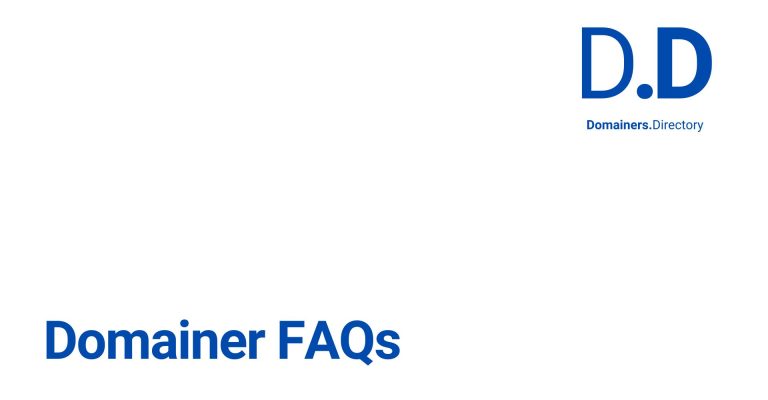Unveiling the Art and Science of Domain Name Valuation In...
Read MoreDemystifying Domaining - New Domainer FAQs
In the vast landscape of the internet, domain names play a pivotal role in defining online identities and establishing a digital presence. Whether you’re a seasoned domainer or a curious beginner, navigating the world of domain names can be both intriguing and complex. To shed light on common questions surrounding domaining, we’ve compiled a comprehensive list of FAQs that cover everything from the basics to the intricacies of domain ownership.

What is domaining?
Domaining, short for domain name investing, is the practice of buying, selling, and managing domain names with the goal of making a profit. Domainers often seek valuable and brandable domains that hold commercial potential.
How to sell domain names?
Selling domain names involves listing them on domain marketplaces, engaging in domain auctions, or reaching out to potential buyers directly. Establishing a fair valuation and effective marketing strategies are essential for successful domain sales.
Who controls and regulates domain names?
The Internet Corporation for Assigned Names and Numbers (ICANN) is the primary regulatory body overseeing domain names. However, individual domain registrars also enforce specific policies and regulations.
A Fully Qualified Domain Name (FQDN) can contain how many characters?
FQDNs can contain up to 253 characters, including the top-level domain (TLD), subdomain, and domain name.
What was the first domain name ever registered?
The first domain ever registered was ‘symbolics.com’ on March 15, 1985.
How many domain extensions are there?
There are hundreds of domain extensions, including generic top-level domains (gTLDs), country code top-level domains (ccTLDs), and specialized domain extensions.
How long can you register a domain name for?
Typically, domain registrations can be made for periods ranging from one to ten years. Renewal is necessary to retain ownership beyond the initial registration period.
How much do domain names cost?
The cost of domain names varies depending on factors such as the registration status, domain extension, and registrar or private sale costs. Prices can range from a few dollars to millions for premium aftermarket domains.
What happens when a domain name expires?
When a domain name expires, it enters a grace period during which the owner can renew it. If not renewed, the domain may go through a redemption period before becoming available for registration by others.
How to secure a domain name from theft (reverse hijacking)?
Implementing strong passwords, enabling two-factor authentication, and regularly monitoring domain registrations can help prevent domain theft. Legal recourse, such as the Uniform Domain-Name Dispute-Resolution Policy (UDRP), can also be pursued.
Can someone take my domain name?
Domain names are subject to legal ownership. Unauthorized attempts to acquire a domain can be challenged through legal means, including UDRP processes.
Who owns a domain name?
The person or entity listed as the registrant in the domain registration details is the legal owner of a domain name.
Are domain names case sensitive?
No, domain names are not case sensitive. They are treated as case-insensitive in the Domain Name System.
What is Geo in domaining?
Geo-domaining involves targeting geographic locations with domain names, often to attract local audiences or businesses.
What is Outbounding?
Outbounding refers to the proactive outreach by domain owners to potential buyers or investors, aiming to sell or lease their domain names.
What is a UDRP (Uniform Domain-Name Dispute-Resolution Policy)?
The UDRP is a process established by ICANN for resolving domain name disputes, particularly cases of cybersquatting or domain hijacking.
What are TLD, ccTLD, and gTLD, and how do they differ?
TLD stands for top-level domain, ccTLD for country code top-level domain, and gTLD for generic top-level domain. TLDs represent the highest level in the domain hierarchy, with gTLDs being more generic and ccTLDs specific to countries or territories.
How to obtain a .gov domain?
Registering a .gov domain is restricted to U.S. federal, state, local, and tribal government agencies. Eligibility is verified by the General Services Administration (GSA).
How to get a .edu domain?
edu domains are reserved for accredited post-secondary institutions in the United States. Eligibility is determined by the Educause organization.
How much time does domaining take?
The time investment in domaining varies based on individual goals and strategies. Success in domain investing often requires continuous learning, monitoring industry trends, and staying informed about market demand.
Conclusion
Navigating the world of domain names involves understanding technical, legal, and market aspects. Whether you’re a beginner or an experienced domainer, these FAQs aim to provide clarity and insights into the multifaceted domain industry. Keep exploring, stay informed, and make informed decisions to thrive in the dynamic world of domaining.
Domainers.directory Articles
What is a Domain Lock – Registrar Locks
Unraveling the Mystery of Domain Locks: Understanding Registrar Locks and...
Read MoreHow to Secure a Domain Name – Domain Name Security and Protection
Safeguarding Your Online Identity: A Guild to Domain Name Security...
Read MoreFreename Web3 Domains – Freename.io Review
Freename: Empowering Web3 Domains for a Decentralized Future In the...
Read More


